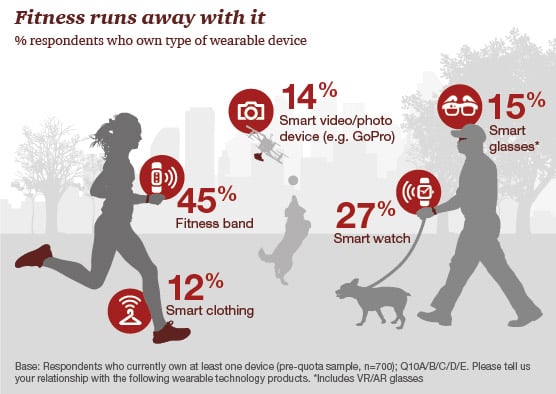In its latest report looking at the wearable device adoption, PricewaterhouseCooper (PwC) has discovered one group that’s significantly more likely to own such product: parents.
In fact, the company has found that 49 percent of parents with a child at home own multiple wearable devices, compared to just 24 percent of non-parents. Furthermore, 20 percent of parents sought out a wearable device for health-related reasons, whereas nonparents were most likely to get their first wearable as a gift.
Unsurprisingly, millennials were more likely than other age groups to own a wearable, but, interestingly, they weren’t the most likely to own a smartwatch. Instead, 35 to 49-year-olds were the most likely smartwatch owners.
In 2014, 45% of respondents thought wearables could decrease obesity, and this year the figure was up to 63%.Of their 1,000 US online survey respondents, PwC found that 49 percent own at least one device, up from 21 percent two years ago (when the same survey was conducted); thirty-six percent of respondents owned more than one wearable device.
Fitness bands were the most popular wearable, with 45 percent reporting owning one, followed by smartwatches (27 percent), smart glasses (15 percent), and smart clothing (12 percent). Across the board, health was the number one reason for purchasing a wearable.
PwC has also discovered that not all wearables had the same degree of attrition: 33 percent of smart clothing users dropped off, compared with 16 percent of smart glasses users. Fitness bands and smartwatches, at 18 percent and 22 percent respectively, fell in the middle.
When it comes to reasons for (not) buying a wearable product, money came at top; the number two reason was the notion that they might not actually use it. Privacy concerns were listed as the number four or five reason not to buy most wearables, but came in third for fitness bands. Interestingly, at 14 percent, fashion was close to the bottom of the list.
Finally, PwC was looking to find out how users feel about the effects wearables will have on society. In 2014, 45 percent thought wearables could decrease obesity, and this year the figure was up to 63 percent. The similar jumps were seen when respondents were asked about the potential of wearables to extend life expectancy (70 percent compared to 56 percent) and to lower insurance premiums (62 percent up from 53 percent).
[Via: mobihealthnews]


